Do you have children between ages 5 & 6 and you are contemplating on the need to enroll them for Grade R programme? This article contains information on Daily Programme For Grade R.
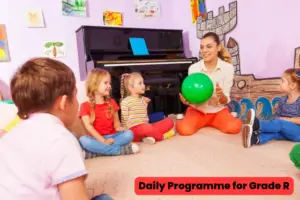
The term “Grade R” is probably not very common in some parts of the world. Grade R is another word for Reception Year in South Africa. It was introduced to prepare children between ages 5-6 year-olds for entering primary school in Grade 1. It is a preschool class which gives children a firm foundation for their education just like in the case of emergent learning. According to Briefly [1], Grade R is not mandatory. However, a child who undergoes this stage has an advantage over the one who skips it because it impacts cognitive, social, emotional, and physical skills during this delicate growth stage. These critical skills prepare children and give them the ability to handle the Primary Level.
The children in Grade R are not just taught anything. Grade R teachers teach within a prescribed curriculum.
A daily program for Grade R is designed to provide these young learners with a structured and balanced day of activities that promote their overall development and learning. The program typically includes a variety of activities that cater to the physical, cognitive, social, emotional, and creative needs of children in this age range.
Here’s a comprehensive breakdown of a typical daily program for Grade R:
1. Morning Routine (7:30-8:00)
Arrival) Morning Contact:
Teachers are in class and available to see parents who arrive at school with their children. At this time, children arrive at school, greet their teachers and friends, and settle in their classrooms.
Attendance:
Teachers take attendance and engage in a brief morning meeting to set the tone for the day.
Morning Circle Time
This is also referred to as the Morning ring [2]. Here, children gather for a group activity, such as singing songs, reciting rhymes, or sharing news, identifying colors, etc.
2. Toilet Time (8:00 – 8:30)
A designated break for children to use the restroom facilities and practice good hygiene habits.
3. Language and Literacy (8:30 – 9:40)
Story Time:
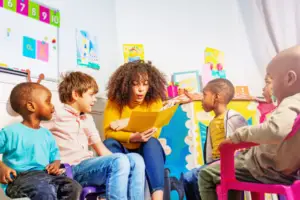
Teachers read aloud to the children, fostering a love for books and developing listening skills.
Phonics and Word Work:
These are engaging activities to introduce letter sounds, sight words, and basic phonetic skills.
Writing and Handwriting:
Children practice writing their names, tracing letters, and forming simple words or sentences.
4. Mathematics (9:40 – 9:45)
Number Recognition and Counting:
These activities help children recognize numbers, count objects, and understand basic numeracy.
Shapes and Patterns:
Part of the daily programmes for Grade R includes exploring different shapes, patterns through hands-on activities and games.
Problem-Solving:
Introducing simple problem-solving tasks to develop logical thinking and reasoning skills.
5. Refreshment/Snack Time (9:50 – 10:20)
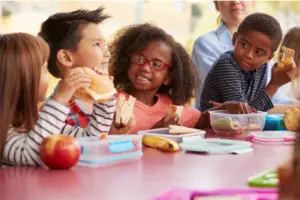
A designated break for children to have a healthy snack or refreshments and hydrate themselves before commencing other activities set aside for the day. Learners sit at the tables and enjoy their refreshments, teachers teach them good table manners etc.
6. Free Play inside (10:20 -11:50)
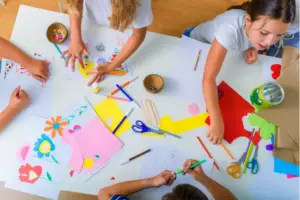
Children have time to engage in self-directed play indoors, promoting creativity and imagination in areas including;
Drawing and Painting:
Children engage in art activities, using various materials and techniques to express their creativity.
Craft Projects:
Hands-on projects involving cutting, pasting, and assembling, which encourage fine motor skills and foster imagination.
7. Story Time (11:50 -12:10)
Teacher tells a story in the class to learners.
Story time is a valuable component of the daily routine in a Grade R setting. It offers numerous benefits for children’s language development, literacy skills, imagination, and emotional well-being.
It provides an opportunity for children to engage with literature, develop listening skills, encourage imagination, empathy, and critical thinking as children follow the narratives and explore the themes presented in the stories.
8. Outdoor Free Play (12:10 – 12:40):
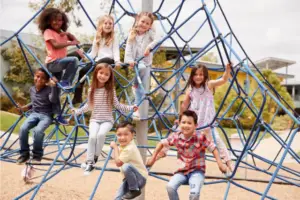
Although opportunities for fun, creativity and imagination are maximized, the play environment is structured and facilitated with learning aims in mind. Activities that are available on a daily basis include: swinging, bicycle riding, sliding, setting the scene with props to suggest different scenes, etc, allowing them to develop gross motor skills, socialize, and appreciate the beauty of nature.
9. Toilet Routine (12:40 – 12:50)
During the afternoon session, a designated break is scheduled to allow children to use the restroom facilities. This break ensures that children have the opportunity to relieve themselves and maintain comfort throughout the rest of the day.
By establishing consistent routines and promoting good hygiene practices, teachers help children develop independence, self-care skills, and an understanding of the importance of personal hygiene.
10. Rest Time (12:50 – 1:30)
A quiet period where children can rest, nap, or engage in calm activities like listening to soft music or looking at books.
12. Freeplay /Home Time (1:30 – 2:00)
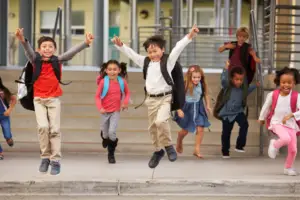 Closing Circle:
Closing Circle:
This is a wrap-up session where children discuss their day, reflect on what they have learned, play outside while waiting for their parents and say goodbye.
Conclusion
It’s important to note that the specific activities, their order and time may vary from school to school or based on the curriculum being followed. Teachers should also incorporate flexibility and adaptability into the daily program to meet the individual needs and interests of the children in their care.
Irrespective of the fact that Grade R is not compulsory, every child deserves a chance to pass through Grade R. These classes will help children get used to going to school. Children perform best in class when they familiarize themselves with their learning environment before getting down to serious studies.
References
[1] Gitonga, Ruth. “Grade R: Everything You Need to Know about South Africa’s Reception Year.” Briefly, 18 Aug. 2021, https://briefly.co.za/107099-grade-r-everything-south-africas-reception-year.html.
[2] “Valley Pre-Primary.” Valleypreprimary.Co.Za, https://www.valleypreprimary.co.za/daily-programme/.
Don’t miss out on current updates, kindly like us on Facebook & follow us on Follow @EAfinder OR leave a comment below for further inquiries






